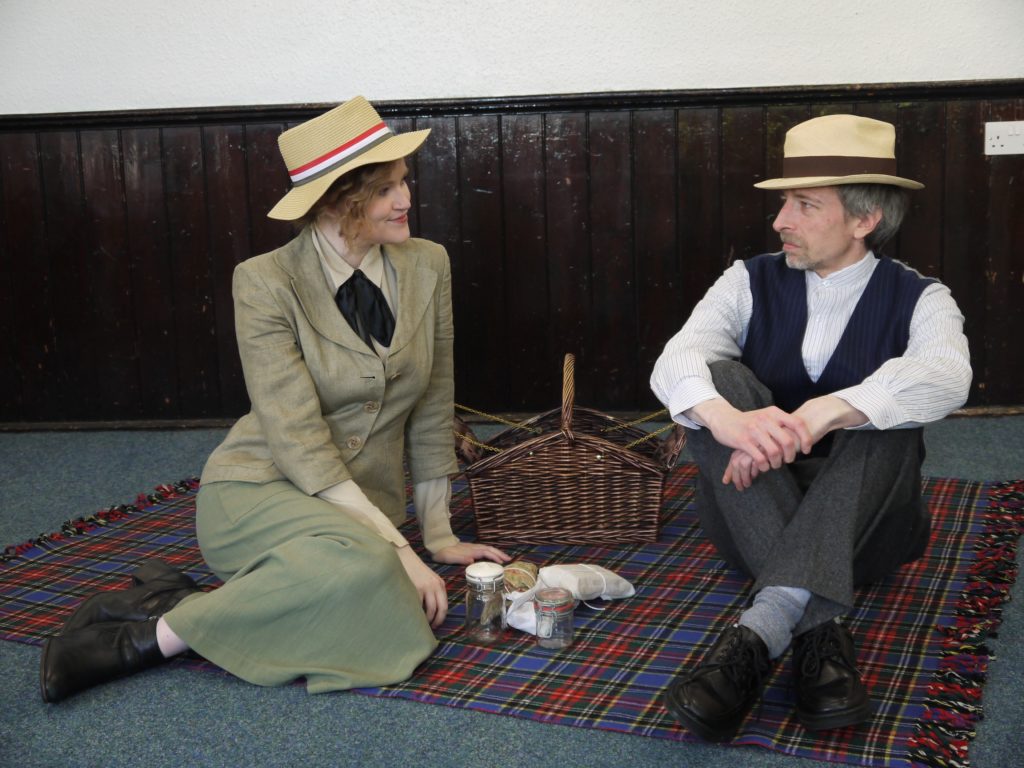
ALFRED Hitchcock wanted to turn “the strangeness” of J M Barrie’s supernatural drama Mary Rose into a film with Tippi Hedren in the title role (but Universal Studios thwarted him).
The 1920 drama featured in the Guardian theatre critic Michael Billington’s list of Forgotten Plays. “I still think the play is due for rediscovery,” he wrote in August 2020, having seen the Hebridean ghost story 48 years earlier starring Mia Farrow in Manchester.
Now York Actors Collective grant him his wish in their third production, adapted and directed by artistic director Angie Millard for their York Theatre Royal Studio debut.
Angie’s mother called it one of her favourite plays, drawn to the “beautiful, charming story” at a long-gone performance in Sheffield. In turn, Angie wanted to explore why.
Here is the result, wherein she has, in her words, “severely adapted” Barrie’s text. “I have adapted the piece to suit contemporary audiences and offer a little more explanation than JM Barrie provided,” she explains in her programme note.
CharlesHutchPress is delighted to report that every decision was right, starting with the haunted manor house being relocated to Yorkshire, from Sussex, to bring it uncomfortably close to home for York audiences.
Millard has changed the structure too, from three acts with two intervals to three scenes pre-interval, then two more after the break, tightening the running time to increase the dramatic tension of a ghost story timed to coincide with Halloween. [On that theme, the lighting designer could not have a more apt name than Peter Howl!]
Spanning 41 years, taking in two World Wars and major changes in British society, Millard’s dramatisation opens in the Yorkshire house in 1950, where the furniture is covered in dust sheets and Beryl Nairn’s Mrs Ottery looks as white as one of those sheets as she leads Chris Pomfrett’s grizzled former soldier, Harry, into the drawing room.
He is the “lost boy” of the piece, needing to settle matters in his troubled mind from his past before returning to Australia (the ever-detailed Pomfrett giving him Aussie inflexions to acknowledge his time spent there), but Mrs Ottery is reluctant to let him into the next room. Is she in there, he asks. The aforementioned ghost.
The ashen Mrs Ottery departs, Harry falls asleep in the corner chair, whereupon the past comes alive, opening in 1909 as pipe-smoking Tony Froud and Victoria Delaney’s ever-so Edwardian Mr and Mrs Morland are discussing daughter Mary Rose (Xandra Logan), who has taken to her regular hiding place, the apple tree.
We shall learn that Mary Rose is young for her age, always wanting to play games. Her behaviour would now be called autistic, suggested Millard in her CharlesHutchPress interview, and when Simon (Laurence O’Reilly), a man in his 40s, seeks her hand in marriage at 18, the Morlands feel the need to reveal her past. Namely her childhood disappearance on an Hebridean island, returning out of thin air a month later with no recollection or explanation.
She will vanish again on a visit with her husband, only to turn up at the Morland house years later. Everyone else has aged, but she looks the same. (Whereas Barrie’s Peter Pan refuses to grow up, his Mary Rose simply doesn’t.)
Your reviewer last saw Xandra Logan (or ‘Alexandra’ as she was credited in the cast list) as un uppity fledgling actress, Lily, in York Shakespeare Project’s Summer Sonnets in August, and here she comes on leaps and bounds as Mary Rose, outwardly young in physical appearance and manner but internally damaged by the loss of her young son in Barrie’s intense study of mother-love (drawing on his own experience as a neglected child).
Millard has cast well throughout, from Nairn’s haunted figure in black to Joy Warner’s ever-concerned, philosophical Scottish gillie, Cameron; O’Reilly’s stern, earnest Simon to Clare Halliday’s Molly, the Morland’s supportive friend.
As much through what is not said as is said, Froud and Delaney capture the frictions and schisms of a couple struggling with parenting skills behind their Edwardian airs.
Pomfrett, delightfully irascible as a shamelessly corrupt police chief in Black Treacle Theatre’s Accidental Death Of An Anarchist only a fortnight ago, is a darker soul here, restless and questing as he bookends Barrie’s disturbed time play.
His closing scene of reconciliation with Logan’s Mary Rose is beautifully judged in tone by both players, bringing to a close this classy production of Barrie’s intriguing, strange, beguiling tale of liminal mystery, mother-and-son bonds, the burdens of loss and laying ghosts to rest.
What a shame that Hitchcock’s film plans hit a hitch but thankfully York Actors Collective have brought this Mary Rose back to the surface, revealing anew its hidden treasures.
York Actors Collective in Mary Rose, York Theatre Royal Studio, today at 2pm and 7.45pm. Box office: 01904 623568 or yorktheatreroyal.co.uk.

